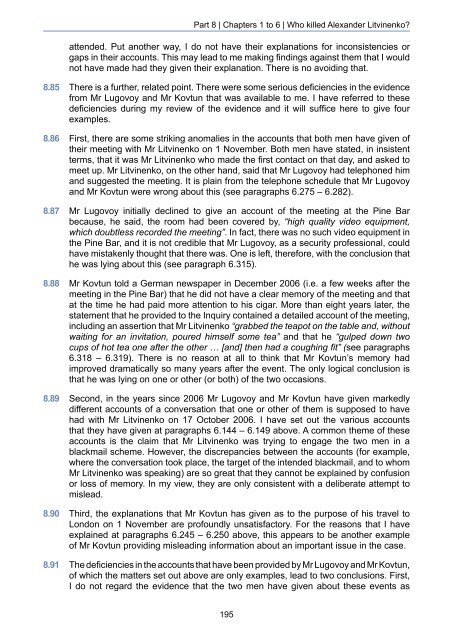The Litvinenko Inquiry
JIEp7Zyr
JIEp7Zyr
You also want an ePaper? Increase the reach of your titles
YUMPU automatically turns print PDFs into web optimized ePapers that Google loves.
Part 8 | Chapters 1 to 6 | Who killed Alexander <strong>Litvinenko</strong>?<br />
attended. Put another way, I do not have their explanations for inconsistencies or<br />
gaps in their accounts. This may lead to me making findings against them that I would<br />
not have made had they given their explanation. <strong>The</strong>re is no avoiding that.<br />
8.85 <strong>The</strong>re is a further, related point. <strong>The</strong>re were some serious deficiencies in the evidence<br />
from Mr Lugovoy and Mr Kovtun that was available to me. I have referred to these<br />
deficiencies during my review of the evidence and it will suffice here to give four<br />
examples.<br />
8.86 First, there are some striking anomalies in the accounts that both men have given of<br />
their meeting with Mr <strong>Litvinenko</strong> on 1 November. Both men have stated, in insistent<br />
terms, that it was Mr <strong>Litvinenko</strong> who made the first contact on that day, and asked to<br />
meet up. Mr <strong>Litvinenko</strong>, on the other hand, said that Mr Lugovoy had telephoned him<br />
and suggested the meeting. It is plain from the telephone schedule that Mr Lugovoy<br />
and Mr Kovtun were wrong about this (see paragraphs 6.275 – 6.282).<br />
8.87 Mr Lugovoy initially declined to give an account of the meeting at the Pine Bar<br />
because, he said, the room had been covered by, “high quality video equipment,<br />
which doubtless recorded the meeting”. In fact, there was no such video equipment in<br />
the Pine Bar, and it is not credible that Mr Lugovoy, as a security professional, could<br />
have mistakenly thought that there was. One is left, therefore, with the conclusion that<br />
he was lying about this (see paragraph 6.315).<br />
8.88 Mr Kovtun told a German newspaper in December 2006 (i.e. a few weeks after the<br />
meeting in the Pine Bar) that he did not have a clear memory of the meeting and that<br />
at the time he had paid more attention to his cigar. More than eight years later, the<br />
statement that he provided to the <strong>Inquiry</strong> contained a detailed account of the meeting,<br />
including an assertion that Mr <strong>Litvinenko</strong> “grabbed the teapot on the table and, without<br />
waiting for an invitation, poured himself some tea” and that he “gulped down two<br />
cups of hot tea one after the other … [and] then had a coughing fit” (see paragraphs<br />
6.318 – 6.319). <strong>The</strong>re is no reason at all to think that Mr Kovtun’s memory had<br />
improved dramatically so many years after the event. <strong>The</strong> only logical conclusion is<br />
that he was lying on one or other (or both) of the two occasions.<br />
8.89 Second, in the years since 2006 Mr Lugovoy and Mr Kovtun have given markedly<br />
different accounts of a conversation that one or other of them is supposed to have<br />
had with Mr <strong>Litvinenko</strong> on 17 October 2006. I have set out the various accounts<br />
that they have given at paragraphs 6.144 – 6.149 above. A common theme of these<br />
accounts is the claim that Mr <strong>Litvinenko</strong> was trying to engage the two men in a<br />
blackmail scheme. However, the discrepancies between the accounts (for example,<br />
where the conversation took place, the target of the intended blackmail, and to whom<br />
Mr <strong>Litvinenko</strong> was speaking) are so great that they cannot be explained by confusion<br />
or loss of memory. In my view, they are only consistent with a deliberate attempt to<br />
mislead.<br />
8.90 Third, the explanations that Mr Kovtun has given as to the purpose of his travel to<br />
London on 1 November are profoundly unsatisfactory. For the reasons that I have<br />
explained at paragraphs 6.245 – 6.250 above, this appears to be another example<br />
of Mr Kovtun providing misleading information about an important issue in the case.<br />
8.91 <strong>The</strong> deficiencies in the accounts that have been provided by Mr Lugovoy and Mr Kovtun,<br />
of which the matters set out above are only examples, lead to two conclusions. First,<br />
I do not regard the evidence that the two men have given about these events as<br />
195


